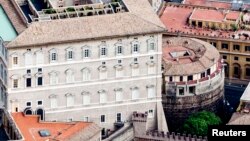VATICAN CITY —
Reports of suspicious financial transactions at the Vatican leapt to 202 in 2013 from six the previous year, its Financial Information Authority (AIF) said on Monday, attributing the rise to keener vigilance prompted by reforms at the scandal-ridden Vatican Bank.
Since 2010, the Vatican has been enacting new legislation to bring its bank, the Institute for Works of Religion (IOR), in line with international standards on financial transparency money laundering.
The AIF said the bulk of the Suspicious Transaction Reports (STR) it had received involved the bank, but declined to give specific numbers or percentages. Only five were considered serious enough to be referred to the Vatican's prosecutor.
“We are not perfect yet, we are not super-good yet,” Rene Bruelhart, the Swiss lawyer who heads the AIF, told a news conference. “We are more than satisfied that the direction we are going is good but there is still quite a bit of way to go”.
A report last December by Moneyval, a monitoring committee of the Council of Europe, said the Vatican had enacted significant reforms but must still exercise more oversight over its bank.
Bruelhart said his department had carried out an on-site inspection of the IOR this year to make sure that anti-money laundering procedures had taken root.
Pope Francis, who has said Vatican finances must be transparent in order for the Church to have credibility, decided against closing the IOR on condition that reforms continued.
Illegitimate accounts
Bruelhart said the bank had made “substantial progress” in investigating client relationships and closing the accounts of clients who were not entitled to them.
Only Vatican employees, religious institutions, orders of priests and nuns and Catholic charities are allowed to have accounts at the bank. But investigators have found that a number were being used by outsiders or that legitimate account holders were handling money for third parties.
Monsignor Nunzio Scarano, a former senior Vatican accountant who had close ties to the IOR, is currently on trial accused of plotting to smuggle millions of dollars into Italy from Switzerland in a scheme to help rich friends avoid taxes.
Scarano has also been indicted on separate charges of laundering millions of euros through the IOR. Paolo Cipriani and Massimo Tulli, the IOR's director and deputy director, who resigned last July after Scarano's arrest, have been ordered to stand trial on charges of violating anti-money laundering norms.
Bruelhart said the AIF had opened an “autonomous investigation” of the case and was cooperating with Italian authorities.
Of the 202 reports of suspicious transactions passed to the AIF, Bruelhart said many “did not have enough meat on the bone” to continue being scrutinized and others were still being examined.
Bruelhart said the Vatican was increasing its cooperation with other countries, notably on fighting money laundering.
He said the AIF had made 28 requests to foreign authorities for information on suspected financial crime in 2013, up from only one in 2012, and had itself received 53 such requests, up from three.
Since 2010, the Vatican has been enacting new legislation to bring its bank, the Institute for Works of Religion (IOR), in line with international standards on financial transparency money laundering.
The AIF said the bulk of the Suspicious Transaction Reports (STR) it had received involved the bank, but declined to give specific numbers or percentages. Only five were considered serious enough to be referred to the Vatican's prosecutor.
“We are not perfect yet, we are not super-good yet,” Rene Bruelhart, the Swiss lawyer who heads the AIF, told a news conference. “We are more than satisfied that the direction we are going is good but there is still quite a bit of way to go”.
A report last December by Moneyval, a monitoring committee of the Council of Europe, said the Vatican had enacted significant reforms but must still exercise more oversight over its bank.
Bruelhart said his department had carried out an on-site inspection of the IOR this year to make sure that anti-money laundering procedures had taken root.
Pope Francis, who has said Vatican finances must be transparent in order for the Church to have credibility, decided against closing the IOR on condition that reforms continued.
Illegitimate accounts
Bruelhart said the bank had made “substantial progress” in investigating client relationships and closing the accounts of clients who were not entitled to them.
Only Vatican employees, religious institutions, orders of priests and nuns and Catholic charities are allowed to have accounts at the bank. But investigators have found that a number were being used by outsiders or that legitimate account holders were handling money for third parties.
Monsignor Nunzio Scarano, a former senior Vatican accountant who had close ties to the IOR, is currently on trial accused of plotting to smuggle millions of dollars into Italy from Switzerland in a scheme to help rich friends avoid taxes.
Scarano has also been indicted on separate charges of laundering millions of euros through the IOR. Paolo Cipriani and Massimo Tulli, the IOR's director and deputy director, who resigned last July after Scarano's arrest, have been ordered to stand trial on charges of violating anti-money laundering norms.
Bruelhart said the AIF had opened an “autonomous investigation” of the case and was cooperating with Italian authorities.
Of the 202 reports of suspicious transactions passed to the AIF, Bruelhart said many “did not have enough meat on the bone” to continue being scrutinized and others were still being examined.
Bruelhart said the Vatican was increasing its cooperation with other countries, notably on fighting money laundering.
He said the AIF had made 28 requests to foreign authorities for information on suspected financial crime in 2013, up from only one in 2012, and had itself received 53 such requests, up from three.





